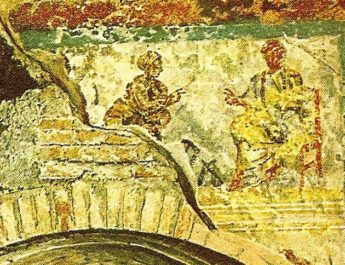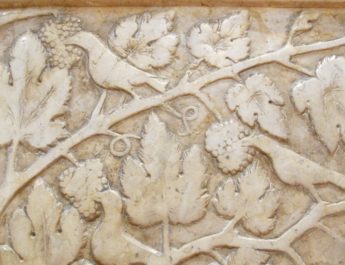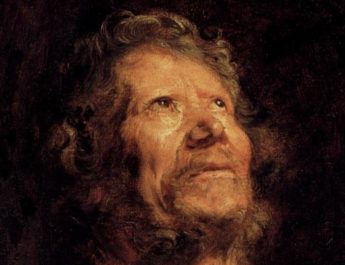Psalm 115
BibleHub
1 Not to us, O Lord,A not to us, but to your nameB giveC glory,D
Notes on verse 1a
A “Lord” = YHVH. From havah (to be, become) or hayah (to come to pass, become, be). This is the name of the God of Israel, the self-existent and eternal one, the tetragrammaton. This pronunciation has been lost to time so “Lord” is generally used in its place.
B “name” = shem. May be from sum (to put, place, set). This is name, fame, renown. A name was thought to indicate something essential about a person – something about their individuality. So, this word can also mean honor, authority, or character.
C “give” = natan. This is to give, put, set, offer. It is to give literally or figuratively.
D “glory” = kabod. From kabad (to be heavy, weighty, burdensome). This is weighty. Figuratively, glorious, abundant, riches, honor, splendor – a reference to one’s reputation or character. This word is often used to describe God and God’s presence.
for the sake of your steadfast loveE and your faithfulness.F
2 Why should the nationsG say,
“WhereH is their God?”I
Notes on verses 1b-2
E “steadfast love” = chesed. From chasad (being good, kind, merciful; may mean bowing one’s neck as is done in the presence of an equal for courtesy’s sake; so, if one in a superior position is treating you like an equal, that is what is captured here). This is favor, goodness, kindness, loving kindness, pity, reproach, or a good deed. When done by God to humanity, this is mercy/loving kindness. When done by humanity to God, it is piety.
F “faithfulness” = emet. From aman (to believe, endure, fulfill, confirm, support, be faithful, put one’s trust in, be steadfast. Figuratively, this is to be firm, steadfast, or faithful, trusting, believing, being permanent, morally solid). This is firmness or stability. Figuratively, it is faithfulness, truth, or trustworthiness. This is the same root that “amen” comes from.
G “nations” = goy. From the same root as gevah (the back, person, or body); related to gev (among); related to gaah (to rise up). This is nation or people. Often used to refer to Gentiles or foreign nations. It can also be used figuratively for a group of animals. This is where the Yiddish “goy” comes from.
H {untranslated} = na. This particle is used for requests or for urging. It can be we pray, now, I ask you, oh. This is the same “na” in “hosanna.”
I “God” = Elohim.
3 Our God is in the heavens;J
he doesK whateverL he pleases.M
4 Their idolsN are silverO and gold,P
Notes on verses 3-4a
J “heavens” = shamayim. Root may mean being lofty. This is sky, the air, or heaven. It is in a dual noun form so this might refer to the part of the sky where the clouds move on the one hand and the part beyond that where the sun, moon, and stars are on the other hand.
K “does” = asah. This is to make, do, act, appoint, become in many senses.
L “whatever” = kol. From kalal (to complete). This is all or every.
M “pleases” = chaphets. Properly, this means inclined towards or bending to. Figuratively, it means to desire, delight in, or be pleased with.
N “idols” = atsab. 18x in OT. From atsab (to shape, fashion). This is an idol or an image.
O “silver” = keseph. From kasaph (to long for, be greedy; to become pale). This is silver or money.
P “gold” = zahab. Root may mean to shimmer. This is gold or something that has the color of gold like oil. It can also refer to a clear sky – to good weather.
the workQ of humanR hands.S
Notes on verse 4b
Q “work” = maaseh. Related to “does” in v3. From asah (see note K above). This is a word – any action whether positive or negative. It can also be a transaction, construction, activity, property, or something that is produced.
R “human” = adam. Perhaps from adam (to be red, make ruddy); related to adamah (ground, dirt, earth). This is man, humankind, also Adam’s name. It refers to a human individual or humanity.
S “hands” = yad. This is hand, ability, power. Hand in a literal sense, but also what one can do or the means by which one does it.
5 They have mouths,T but do not speak;U
eyes,V but do not see.W
Notes on verse 5
T “mouths” = peh. This is mouth in a literal or figurative sense. So, more literally, it can be beak or jaws. More figuratively, it refers to speech, commands, or promises.
U “speak” = dabar. This is generally to speak, answer, declare, or command. It might mean to arrange and so to speak in a figurative sense as arranging words.
V “eyes” = ayin. This is eye in a literal or figurative sense so eye, appearance, favor, or a fountain (the eye of the landscape).
W “see” = raah. This is to see in a literal or figurative sense so stare, advise, think, view.
6 They have ears,X but do not hear;Y
noses,Z but do not smell.AA
Notes on verse 6
X “ears” = ozen. This is ear, hearing, audience, show. Properly, it is broadness – applied to its ear in reference to its shape.
Y “hear” = shama. This is to hear, call, consent, or consider. It implies listening intelligently, giving attention, and, because of these two factors, obedience and action are often implied.
Z “noses” = aph. From anaph (to be angry; properly, breathing hard as a signifier of being enraged). This properly refers to the nose or nostril and by extension the face. It can specifically refer to anger or wrath as one breathes hard and nostrils flare in times of great anger.
AA “smell” = ruach. 11x in OT. Related to riach (scent, odor, perceive). This is to blow or breathe. It can imply to perceive, anticipate, or enjoy.
7 They have hands, but do not feel;BB
feet,CC but do not walk;DD
they make no soundEE in their throats.FF
Notes on verse 7
BB “feel” = mush. 2x in OT. This is to touch or handle.
CC “feet” = regel. This is foot, endurance, or journey. It is a foot as the means of walking and so it implies a step or a greater journey. It can be used euphemistically for private parts.
DD “walk” = halak. This is go, come, walk. It is walk literally and figuratively and includes people and animals. It can be used figuratively for one’s moral life – how we walk according to God’s way or against it. It can also refer to the walk of life as in the course one’s life takes, the choices we make, etc.
EE “make…sound” = hagah. This is to speak, declare, make a sound, imagine, or mutter. It could be a murmur, moan, or growl, whether from delight or anger. It can also mean to study, ponder, or meditate.
FF “throats” = garon. 7x in OT. Perhaps from garah (to contend, provoke conflict, stir up strife, meddle; properly, to grate – figuratively to cause anger) OR from garar (to drag or drag off in a rough fashion, chew, sweep, destroy; to chew the cud). This is mouth, throat, head, or neck.
8 Those who makeGG them areHH like them;
so are allII who trustJJ in them.
Notes on verse 8
GG “make” = asah. Same as “does” in v3. See note K above.
HH “are” = hayah. Related to “Lord” in v1. See note A above.
II “all” = kol. Same as “whatever” in v3. See note L above.
JJ “trust” = batach. This is to hide for refuge, be secure or sure. Figuratively, it refers to trust, being confident, or hoping.
9 O Israel,KK trust in the Lord!
He is their helpLL and their shield.MM
Notes on verse 9
KK “Israel” = Yisrael. Related to “God” in v2. From sarah (to persist, exert oneself, contend, persevere, wrestle, prevail) + el (see note I above). This is Israel, meaning God strives or one who strives with God; new name for Jacob and for his offspring. This refers to the people and to the land.
LL “help” = ezer. From azar (to help, protect, support, ally; properly, to surround so as to provide aid). This is help, aid, or helper. This word is used in Genesis 2:18 when God decides to make for Adam, “a helper as his partner.” If the same word can be used of God’s help (as in Psalm 121:1), then we should not downplay the significance of this formulation of “help.”
MM “shield” = magen. From ganan (to surround, cover, defend, protect). This is a shield, defense, or figuratively a protector. It can also be used for a crocodile’s hide.
10 O houseNN of Aaron,OO trust in the Lord!
He is their help and their shield.
11 You who fearPP the Lord, trust in the Lord!
He is their help and their shield.
Notes on verses 10-11
NN “house” = bayit. Probably from banah (to build, make, set up, obtain children; to build literally or figuratively). This is house, court, family, palace, temple.
OO “Aaron” = Aharon. Derivation uncertain. May mean “bearer of martyrs” OR be related to Ancient Egyptian ꜥḥꜣ rw (warrior lion) OR elevated, exalted, high mountain. This is Aaron. See https://en.wiktionary.org/wiki/Aaron
PP “fear” = yare. From yare (to fear, be afraid, dreadful; also fearful reverence – to fear in a moral sense is to say to revere, respect). This is fearful or morally reverent.
12 The Lord has been mindfulQQ of us; he will blessRR us;
he will bless the house of Israel;
he will bless the house of Aaron;
13 he will bless those who fear the Lord,
both smallSS and great.TT
Notes on verses 12-13
QQ “been mindful” = zakar. This is to remember, to mark something so that it can be recalled, to be mindful of, to mention.
RR “bless” = barak. This is to kneel, to bless. It is blessing God as part of worship and adoration or blessing humans to help them. It can be used as a euphemism to say curse God.
SS “small” = qatan. From quwt (grieved, cut off, to detest). This is least, small, young, little one. It is literally smaller whether in amount or size. Figuratively it is smaller in the sense of younger or less important.
TT “great” = gadol. From gadal (to grow up, become great, become wealthy – to advance. The root meaning may be to twist in the sense of the process of growing). This is great, high, bigger, noble, old, marvelous. It can also refer to someone who is powerful or distinguished.
14 May the Lord give you increase,UU
both you and your children.VV
15 May you be blessed by the Lord,
who made heaven and earth.WW
16 The heavens are the Lord’s heavens,
but the earth he has given to human beings.XX
Notes on verses 14-16
UU “give…increase” = yasaph. This is to add, increase, continue, exceed.
VV “children” = ben. Related to “house” in v10. From banah (see note NN above). This is son, age, child. It is son in a literal or figurative sense.
WW “earth” = erets. Root may mean to be firm. This is earth, ground, field land, or country.
XX “human beings” = ben + adam. Literally, “children of humanity.” Ben is the same as “children” in v14. See note VV above. Adam is the same as “human” in v4. See note R above.
17 The deadYY do not praiseZZ the Lord,AAA
Notes on verse 17a
YY “dead” = mut. This is to die in a literal or figurative sense. It can also refer to being a dead body.
ZZ “praise” = halal. This is to be clear – it originally referred to a sound, then a color. It was to shine and then make a show or boast then to rave. In a causative sense it came to mean celebrate, give glory, sing praise, or be worth of praise. Because of the celebratory nature of the word, it could also mean to give in marriage. This is where Hallelujah comes from.
AAA “Lord” = Yah. Related to “Lord” in v1 & “are” In v8. From YHVH (see note A above). This is Lord or God – a shortened form of God’s most holy name.
nor do anyBBB that go downCCC into silence.DDD
18 But we will bless the LordEEE
from this time on and forevermore.FFF
Praise the Lord!GGG
Notes on verses 17b-18
BBB “any” = kol. Same as “whatever” in v3. See note L above.
CCC “go down” = yarad. This is to go down, descend; going down in a literal or figurative sense. It can be going to the shore or a boundary, bringing down an enemy.
DDD “silence” = dumah. 2x in OT– both in Psalms. This is silence. Figuratively, it can mean death.
EEE “Lord” = Yah. Same as “Lord” in v17. See note AAA above.
FFF “forevermore” = ad + olam. Ad is until. Olam is a long scope of time whether in the past (antiquity, ancient time) or in the future (eternal, everlasting).
GGG “Lord” = Yah. Same as “Lord” in v17. See note AAA above.
Image credit: “untitled – raising my hands to the sky” by Yuma Hori, 2007.




